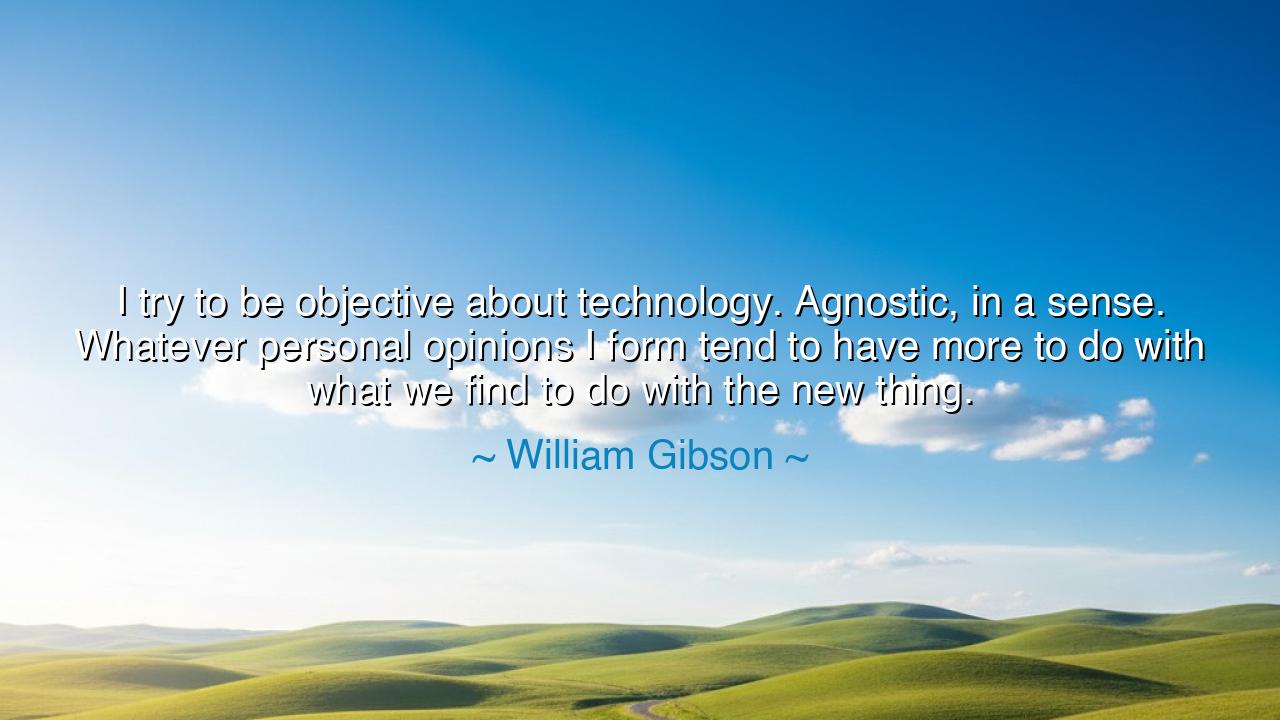
I try to be objective about technology. Agnostic, in a sense.
I try to be objective about technology. Agnostic, in a sense. Whatever personal opinions I form tend to have more to do with what we find to do with the new thing.






Hear, O children of tomorrow, the wisdom of William Gibson, who declared: “I try to be objective about technology. Agnostic, in a sense. Whatever personal opinions I form tend to have more to do with what we find to do with the new thing.” These words are not the musings of indifference, but the tempered vision of one who understands that invention itself is neither angel nor demon. For technology is a vessel—empty of virtue, empty of vice—until the hand of humanity fills it with purpose. Gibson teaches that judgment must not fall upon the tool itself, but upon the use to which it is put.
The origin of this truth lies in the long history of invention. Every age has feared and worshiped its tools. Fire was once a terror, then a blessing. The printing press was first praised as divine, then cursed as heretical. The same blade that defends the innocent can also enslave the weak. So too in our age, when technology multiplies with dizzying speed, many cry that it shall save us or destroy us. But Gibson counsels objectivity—to see the tool as it is, to hold no blind faith nor blind fear, but to ask instead: “What shall we do with this new thing?”
Consider, O listeners, the tale of Alfred Nobel, who gave the world dynamite. He envisioned it as a tool for miners and builders, to carve tunnels, to raise foundations, to open paths where none existed. Yet men of war seized it, turning his creation into a weapon of devastation. When Nobel saw what his invention had become, he resolved to leave behind the Nobel Prizes, to honor peace, science, and art. Here lies Gibson’s wisdom: it was not the dynamite that bore the fault, but what humanity chose to do with it.
The ancients too knew this balance. Did not the Greeks wield the gift of rhetoric—words sharpened like spears? Some used it to inspire justice, others to deceive and corrupt. The gift itself was neutral, yet its destiny lay in the character of the speaker. So it is with every new thing: the bow, the compass, the steam engine, the computer, the network of wires and signals we call the internet. Each is a mirror, reflecting not itself but the heart of those who wield it.
Gibson’s words strike deeper still, reminding us that opinions formed too quickly are dangerous. To curse all technology is to live in fear; to worship it blindly is to live in delusion. The wiser path is to remain agnostic, to watch, to learn, to ask: what does this tool bring forth in the hands of humanity? For sometimes, a new creation seems frivolous until it is given a noble task; other times, it seems noble until it is corrupted. Patience and clarity are the guardians of wisdom.
The lesson, then, is clear: let us not condemn nor glorify technology itself, but weigh our hearts and our choices. Judge not the tool, but the user. Ask not, “Is this machine good or evil?” but rather, “What good or evil will we make of it?” Just as a seed may become either a towering tree or a choking weed, depending on how it is tended, so too will each invention become salvation or curse depending on the hands that hold it.
Practical actions flow from this truth. When you encounter a new thing—a device, an app, a system—do not rush to fear or to embrace. Examine how it is used. Choose how you yourself will use it. Seek to bend it toward compassion, toward justice, toward learning, toward connection. Hold yourself to account, for your choices shape not only your destiny but the destiny of the tool itself. Be deliberate, be thoughtful, be responsible.
Thus do we honor the words of William Gibson: that the measure of technology is not in its design, but in its destiny, and its destiny rests in us. Carry this teaching, O children of the future, and when each new thing arrives, neither worship nor fear it—but guide it with wisdom, patience, and love. For in the end, it is not the tool that tells the story of humanity, but what we choose to do with it.






AAdministratorAdministrator
Welcome, honored guests. Please leave a comment, we will respond soon